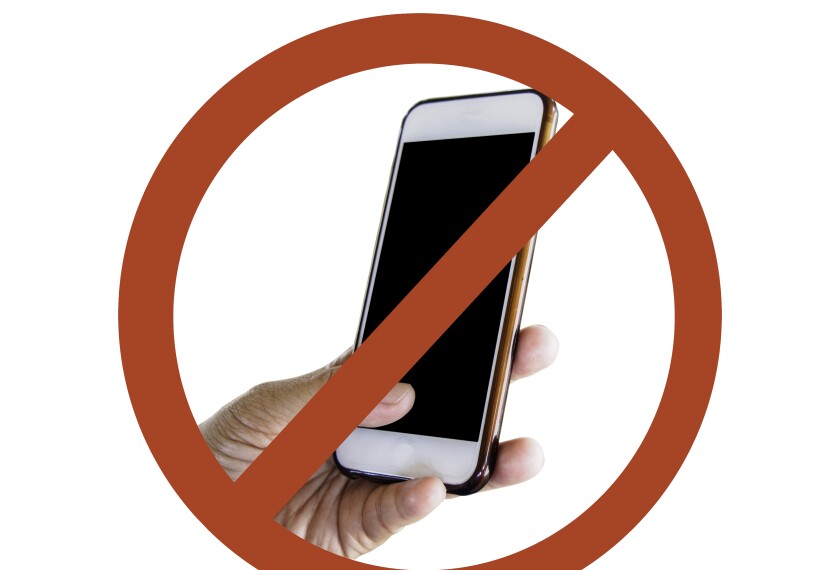School districts have been debating whether to completely ban student cellphones, encourage teachers to integrate them into their instruction, or something in between for about a decade.
Outright bans seem to be gathering momentum, especially at the state level. And just this month, Los Angeles, the nation’s second-largest school district, announced that it will ban the use of student cellphones, beginning in January. In explaining the decision, LAUSD Superintendent Alberto Carvalho argued that the devices distract students from their academics and that social media platforms hurt kids’ mental health.
Plenty of educators agree with him. In fact, nearly 1 of every 4 teachers support completely banning phones, according to a nationally representative survey conducted last fall by the EdWeek Research Center.
But what do educators at the International Society for Technology in Education’s annual conference here in Denver think? ISTE is one of the largest ed-tech conferences in the world. It’s hard to imagine a bigger concentration of ed-tech directors, coaches, and teachers who embrace digital tools.
Surely, the educators in this ed-tech epicenter wouldn’t favor banning a ubiquitous technology like cellphones. Right?
Not exactly. In fact, when two EdWeek reporters approached ISTE attendees to talk about school cellphone policies, we got a range of responses.
Here’s a sample of what we heard.
Why these educators support a cellphone ban
Take: Ban them. They’re a big distraction.
“I am for [bans]. I’m a parent, too, and I understand the safety concerns [of not having direct access to our kids at school], but we need to be able to trust the school. Cellphones are a distraction, and it’s too much to ask a child to pay attention when there’s a phone buzzing in their pocket or a smartwatch vibrating on their wrist.
“They can’t help themselves. It’s human nature. Even as an adult, it’s hard for us to put our phones away and pay attention to a staff meeting.”
—Rachel Lemansky, elementary library coordinator, Dudley-Charlton district, Mass.
Take: Ban them to keep students safe.
“I’m in middle school and it affects everything I do. There are so many layers to [banning cellphones]. It’s a safety issue. As a school, there’s not much we can do to monitor what students do on their personal devices, but we need to be able to know what they’re doing because it’s part of our responsibility.
“It’s also an engagement issue. I need [students] to put the phones away so I can hopefully engage them in the lesson. We’re also a 1-to-1 district now so they don’t need their phones to access learning materials.”
—Gerilyn Williams, middle school math teacher, Pinelands schools, N.J.
Take: Consider a ban, but don’t make teachers the enforcers.
“I am pro exploring [a ban]. We have enough data about social media and mental health issues. We’re stewards of kids’ well-being. If we’re not thinking about doing something [to help], it’s like, what are we doing?
“I’m convinced that you can’t just put it on the teacher. Teachers are already burned out. We already have a shortage. And we’re asking them to have these great relationships with students. But if we maintain the status quo of, ‘it’s the teachers’ decision,’ then we’re inserting a barrier [to relationship building] that doesn’t have to be there.”
—A district technology administrator from Texas who preferred not to be named because the administrator’s views run counter to the district’s policy, which leaves decisions about cellphones up to individual teachers
Why these educators oppose cellphone bans
Take: Don’t ban them because students need to learn to use them.
“As educators in high school, we need to teach students how to use cellphones and when to use them responsibly. If you just ban them, what are we really accomplishing when they go out into the workforce? How do they know when it’s appropriate, where it’s appropriate, how it’s appropriate to use them? The teenage years are the years we figure things out.”
—Candice Breaux, the career and technical education supervisor, West Baton Rouge Parish Schools, La.
Take: Don’t ban them because teachers will devote too much time to enforcing that policy.
“Teachers could spend a lot of energy and effort fighting [cellphones], but I don’t know how far they really would get. The kids, they have cellphones. They’re going to be using them. I personally feel like as educators, especially now, we need to be figuring out how do you help kids use them productively and to get the task done at hand?”
—Lauren Tavarez, director of digital learning, Ector County Independent School District, Texas
Take: They’re problematic, but don’t take them away.
“Since the pandemic, I’ve talked to a lot of teachers across the country. They’re seeing kids having issues trying to talk face-to-face or work in groups. They’re hiding behind their cellphones. It’s become a crutch. And for some of my kids, because they’ve experienced a lot of trauma, they feel safe [with their phones].
“You have to work quite a bit with them to realize, ‘oh, they’re not doing it to be rude.’ You really have to change your mindset that they’re doing it because they don’t feel safe. If I yelled at these kids [to put their phones away], they’re just going to get up and walk out.”
—Kristin Conley, teacher, Arapahoe Ridge High School, an alternative school in Colorado
The argument against all or nothing cellphone policies
Take: Limit them and teach mindfulness practices to keep kids off their phones.
“I do see how it can seem like all or nothing. But we really do need to have a blend. [Students need to understand] if you feel like you’re getting addicted to it, you’re maybe looking at your cellphone at inappropriate times, you can use mindful strategies and give [yourself] permission to put it down to the side.
"[Teachers can help by having] ‘cellphone away time,’ and then maybe the last 10 minutes of class, have it accessible. I’m never good with all or nothing. I always feel like there has to be a balance.”
—Kara Fahy, STEAM and project-based learning coach, Fort Belvoir Upper Elementary, Va.
And the official ISTE take…
Take: Don’t ban them. Teach students to use them.
“In general, banning tools that students are going to need to use in their future life is not a good idea. I do understand that if you have a school or district that has not been able to get ahead of creating a healthy culture for device use, you may need to just take a pause and reset some things to help reinforce some good, healthy habits. And so that may be a choice that some schools are taking.
“I do want to make sure it’s clear that in some way, shape, or form, we have to help young people learn how to use these tools in effective ways, if you want them to be successful in the future.”
—Richard Culatta, ISTE’s CEO
Explore our coverage around students’ use of cellphones in schools:
> Guide to setting a policy: Here’s a decisionmaking tool for educators to map out the different potential outcomes when putting cellphone policies in play.
> Cellphone bans and restrictions: See which states are requiring cellphone restrictions or bans in schools in our tracker. Explore our tracker.
> Nuisance or teaching tool? How teachers are turning an ubiquitous and growing class nuisance—the smartphone—into a tool for learning.
> Cellphone policies, explained: Education Week breaks down the different ways schools are addressing cellphone use, and the factors to weigh before adopting or changing the rules. Check out our explainer.
> Tips from teens & teachers: Teenagers offer 6 tips on how schools should manage students’ cellphone use, and educators share their tips on policing cellphone use in classrooms.
> Then & now: How the “sexting” panic previewed today’s debate about kids’ cellphone use.










